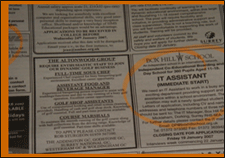|
Changing Places?
 You have decided to change careers, but how do you go about it? You have decided to change careers, but how do you go about it?
In this article, Beth Harvey suggests some simple steps you can follow to help you on your way.
Career change can be a daunting experience, but for many of the clients that I see, it can be a necessity. Changes in skills requirements, technology, and society as a whole often mean that entire classes of job or career can disappear literally overnight.
For others, the idea of doing something different appeals on a more basic level. We spend a lot of time at work; many people now in the their thirties and forties “stumbled” into their careers; which all adds up to facing another twenty or thirty years doing something that lost its attraction a while ago.
So if you decide to change career, through circumstances or interest, how do you go about it? Here are some simple steps you can follow which might help you on your way.
Before starting out on any expensive courses or taking huge leaps of faith, make sure you know what you are getting into. A job that looks exciting and challenging on the surface may not live up to your expectations. Talk to friends, family and other network contacts and see what you can find out about the reality. If you can, try and work shadow someone in your chosen area for a couple of days. You’ll be glad you did!
Make sure that the field you want to enter has an active job market. There is little or no point in retraining in a specialism that is becoming obsolescent.
Some careers are intensely competitive. Media is a prime example; many people do unpaid internships for months in TV, radio or journalism, simply to get some experience on their CV. One of my ex-clients joined a television company as “the oldest runner in town” at the age of 30 to kick-start his career in the area, having worked successful in retail previously. This is fine provided you can afford to live on virtually nothing for some time; not an option for most of us with families to support.
While it is possible to move countries, careers and sectors all at once, it is extremely hard. Try and stage your moves. Remember, the job market in one country may be very different to the market for the same skills in another, and your qualifications may not be valid in another part of the world.
Until you either have a role in your new area lined up, or are about to start a full time course. It may sound obvious, but people do it!
If, and only if, you have considered the steps above, and still decide that you are serious, the time has come to try and take the plunge.
Volunteer, take internships, do whatever you can to show prospective employers that you are serious about your move.
If you can, try to start some educational activity in your chosen area. Again, it will convince potential employers that you are serious.
Take your current skills into the sector you want to target. For example, if you want to become a teacher, and you are currently an accountant, a move to a bursar’s position in a school or a finance post in a college may be a good move. You can get to know the sector while training, and be perfectly positioned to hear about possible jobs.
Finally and most importantly, have faith in yourself. A career change is challenging, and needs to be treated as a serious project, but can put the energy back into your working life.
Enjoy the journey – and enjoy the new career!
Beth Harvey, MSc, MCIPD provides coaching, mentoring and training and development services to clients in a variety of business sectors, including media, publishing and financial services. Beth is an external moderator for the CIPD. Her academic and research interests include mentoring, coaching and career development and transition in financial services organisations. One of her passions is working with individuals who want to re-engineer their lives.
|
 ReConnect Africa is a unique website and online magazine for the African professional in the Diaspora. Packed with
essential information about careers, business and jobs, ReConnect Africa keeps you connected to the best of Africa.
ReConnect Africa is a unique website and online magazine for the African professional in the Diaspora. Packed with
essential information about careers, business and jobs, ReConnect Africa keeps you connected to the best of Africa.



